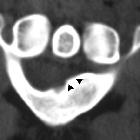neurovaskuläre Kompression






Neurovascular compression syndromes are a form of vascular compression disorders where there is usually compression or distortion of a cranial nerve due to a redundant or aberrant vascular structure.
Clinical presentation
Not all cases of neurovascular contact are clinically symptomatic. Presentation can be extremely variable depending on which structure is compressed. It can range from trigeminal neuralgia or glossopharyngeal neuralgia (somatic sensory), hemifacial spasm (somatic motor), tinnitus and vertigo (special sensory) and some cases of essential hypertension.
Pathology
They are typically caused by arteries that directly contact the cisternal portion of a cranial nerve. The transition zone between the central and peripheral myelin is considered the most vulnerable region for symptomatic neurovascular compression syndromes.
Siehe auch:

 Assoziationen und Differentialdiagnosen zu neurovaskuläre Kompressionssyndrome:
Assoziationen und Differentialdiagnosen zu neurovaskuläre Kompressionssyndrome:




